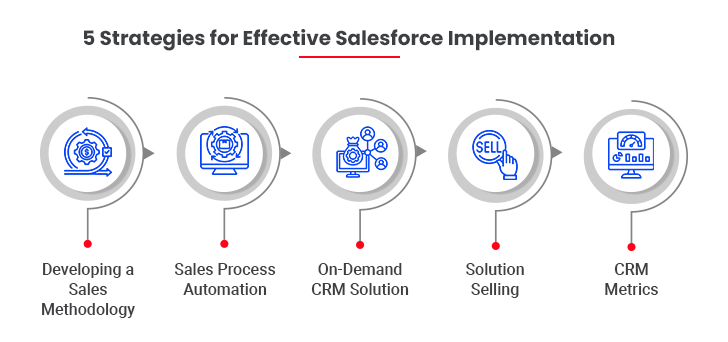The rise of digital, social, search engines, and mobile technologies has resulted in the emergence of a well-informed consumer. Businesses need to be agile, innovative, and client-centric to be able to meet the expectations of customers in the current landscape ruled by technology. With rising customer acquisition costs, organizations need to modify their business model and capabilities to retain their clients. Fortunately, there are cloud-based technology products like Salesforce CRM (Customer relationship management), dedicated to helping companies manage critical customer relationships. Following the right Salesforce implementation steps can ensure that your business unlocks the true potential of Salesforce CRM and maximizes its return on investment.

In recent years, Salesforce CRM software has created a lot of buzz in the business world. A CRM is an all-encompassing management tool that manages varied business processes; from marketing, sales, customer support to feedback, vendors, and various data and information. It takes care of the overall business horizon, simplifies things and saves effort and time of the company.
If you are wondering how to derive more value from an existing investment or looking for the right CRM technology for your business, Salesforce CRM implementation is what you need.
This blog will provide insights on the five Salesforce implementation steps (Salesforce CRM best practices) for the proper use of Salesforce and see how following these can lead your business to solid, lasting and profitable customer relationships.

1. Developing a Sales Methodology
Developing a sales methodology is the first step in Salesforce implementation strategy. It is a planned strategic move that provides guidance and action items that can eventually be used in any sales process. Every organization must develop a unique sales methodology based on its market, vertical, products, and industry position, as there is no one size that fits all standard sales methodology.
A good example of sales methodology is SPIN Sales methodology, in which salespeople ask a series of questions to their clients based on: Situation, Problem, Implication, and Need-Payoff. These questions then get integrated into the sales steps. Another common type of sales methodology is Strategic Selling – where the roles assigned to the different players (economic buyer, influencer), and the red flags, get integrated into the process.
2. Sales Process Automation
Even after developing a robust sales methodology, the process can still run into significant trouble and expense due to several reasons like inefficient process, inadequate qualification, uncoordinated team, etc. However, there are solutions and steps that can iron out the inadequacies. Automating the sales methodology with Salesforce CRM implementation can be a good step to begin with. In today’s customer-centric organizations, CRMs are becoming a standard business practice, and the advantages of Sales Process Automation in a CRM are numerous.
3. On-Demand CRM Solution
On-demand CRMs provide deeper and more essential CRM capabilities such as –industry-specific functionality, scalability, customization, easy-to-use features, and more. It allows businesses to work effectively with partners throughout the sales lifecycle and enables sales representatives to better position opportunity pricing and accurate sales forecasting. Hiring an established Salesforce partner can help businesses follow necessary steps of Salesforce implementation process, keeping CRM updated and optimized.
4. Solution Selling
Thanks to digitization, today’s buyer is more knowledgeable and well-aware than ever before. As a result, businesses must shift their focus on to the customer requirements rather than stressing product benefits and features, paving the way for Solution Selling.
If Solution Selling is your business motto, then an automated CRM system with Project Management (PM) tools would enhance your efforts greatly. Moving ahead with Solution Selling and Automated Sales Processes within your organization will have consequences, for instance, uptake issues from inefficient and complicated tools and interfaces. Businesses need to assess the flexibility PM tools offer and assess the interface for usability within your sales team. The key element behind the PM tools is workflow. It maps your business process and sales methodologies into the CRM System. The moment you set up your business process, you integrate all aspects of the sales process for automation.
The idea is to build a framework and a Salesforce CRM strategy according to your rules, experience, and Salesforce CRM best practices which your entire sales team can follow.
5. CRM Metrics
Performance, improvement, and accountability are crucial mantras that determine the success of businesses today. CRM metrics help attain these mantras and make way for the success of an organization. Irrespective of company size or product, measuring customer satisfaction and loyalty, sales performance, including increasing sales revenues and sales effectiveness, and market share is crucial. Salesforce CRM puts many key metrics at your fingertips: Sales, Marketing, and Service, among others.
Conclusion
Implementation of Salesforce CRM can prove to be revolutionary for your business. By following the above-mentioned Salesforce CRM best practices, you can maximize the value of your CRM implementation. You will be able to ensure an effective and smooth Salesforce implementation that promotes business growth and enhances ROI.
With over a decade of experience with Salesforce CRM implementation and a strong pool of Salesforce certified resources, Damco Solutions helps organizations increase their agility through increased social interaction with customers, collaborative relationships with partners, and flexible and user-friendly enterprise applications. By following the best practices for implementing Salesforce CRM, and ensuring effective planning and ongoing improvement, a business can reap maximum advantages out of its CRM implementation.
Getting started with Salesforce is easy, but keeping up with it requires consistent optimization. This blog will help you optimize Salesforce implementations:





